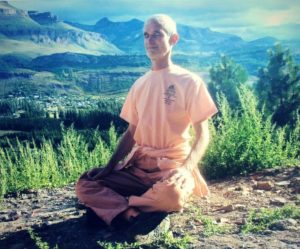Study of Scripture and of Oneself
Effective spiritual growth requires both a regular practice and a deepening awareness of the thought and behavior patterns that determine our ability to experience the truth. For this reason, we chose Svadhyaya, the study and application of scriptures, as the practice for the month of September. Svadhyaya implies both that we read and reflect on sources of reliable wisdom and that we apply that wisdom to our lives. Sri Swami Satchidananda commented that it is better to study a little and integrate it, instead of reading extensively.
I often find myself highlighting the passages in a spiritual book that are really hitting home for me. But if I don’t find any way of incorporating them, a real opportunity is lost. One way to apply a teaching that inspires us is to transform it into an affirmation – a concise, clear phrase that affirms, in our own words, a message that holds deep meaning for us. An affirmation can actively counteract an unhealthy thought pattern that we find ourselves falling into.
Ideally, we turn a teaching we have read into something specific that we do regularly, thus developing habits that embody spiritual principles. For example, contentment can be practiced by daily writing down things we are grateful for. Compassion can be actualized by committing to one or two acts of kindness a day. Will power and control of the senses can be developed in small steps, such as fasting by giving up the evening meal to let the body cleanse itself.
I also see the benefit of understanding Svadhyaya to mean the study of oneself as we apply spiritual teachings, since we need to reflect with stark honesty to observe the subtle motives behind our thoughts and behavior. Whenever I get angry or anxious, for example, a sincere look within reveals some desire or expectation I was counting on that did not or may not come about. Anytime I can catch myself depending on things going my way to be at peace, I can choose to let go of that unhealthy fixation, do my best, and accept whatever outcome emerges.
The best way I know to develop this capacity for self-observation is by meditating regularly. We tend to be so caught up in the self- identity that has formed over our lifetime, that we cannot see outside the lines we have drawn around ourselves. Meditation supports us in stepping outside the stream of thought to bring into our awareness the patterns that give rise to discontent and frustration.
Some years ago, when Swami Asokananda visited San Francisco, he suggested we begin our meditation sessions simply by welcoming and witnessing any thoughts that may arise, a practice of mentally standing apart to observe the contents of the mind. Then, as we continue by focusing on an object of concentration, we further develop this ability to separate ourselves from the thoughts that feel so much like who we are.
This self awareness is essential in applying spiritual teachings that are intended to expose and free us from the selfish thinking that restricts our ability to feel love and compassion, and be at peace as the process of spiritual awakening unfolds. There is a great benefit as well to having the support of others to read, discuss and apply spiritual principles. A scripture study group that meets regularly or a committed practice partner makes learning more enjoyable and makes us more accountable.
There are endless sources of spiritual wisdom available to us for the purpose of practicing Svadhyaya. It’s best to choose a source that we really trust, like the commentary of a widely respected teacher on a scripture. I know it may be difficult to make time for reading this way. At the end of a long day, the idea of studying something profound may seem like too much work. But even a few pages or a short passage from a book, like The Golden Present: Daily Inspirational Readings by Sri Swami Satchidananda, can reinforce the principles we intend to live by. Repeated reminders of such wisdom helps keep us on track and even gradually helps reshape the subconscious with the truth.
If this teaching speaks to you, consider joining our weekly scripture study group, Wednesdays, 6:30 – 7:30 pm. It’s an open series (you don;t need to sign up in advance) with a small group of committed practitioners that come together to discuss how to apply Yoga in daily life. May we all find ways to incorporate this beneficial practice.



